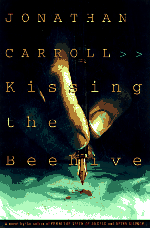
Following the publication of Jonathan Carroll’s last novel, From the Teeth of Angels, and his collection of short stories, The Panic Hand, the rumors were flying that Carroll was retiring. In interviews and personal comments, Carroll had made it clear that From the Teeth of Angels was the last novel in the “Answered Prayers” group of books. (That group, begun with Bones of the Moon, cannot rightly be called a series, because the stories, although inter-related, are not truly sequential.) When news of his latest book finally arrived, fans met it with relief, although there may have been some trepidation regarding what the book would actually be like.
The faithful should not have worried. Kissing the Beehive, while quite different in plot from all of his previous writing, is still vintage Carroll. It has everything we have come to expect from Carroll after ten books and as many short stories: a first person narrator, quirky characters, richly told details, scenes horrendous and wonderful. Kissing the Beehive has it all — except for the side-step into fantasy.
Bestselling author Sam Bayer has a fine career in writing thrillers, but something seems missing to him after all these years. For the first time, his words fall flat on the page. It is not writer’s block that plagues him, because he still types, the pages still fill up. But instead of the action and intrigue that drew readers into his previous books, he can tell that his new one is lacking any vitality. A chance occurrence reminds him of an instance from his childhood, when he found the body of a drowned woman in his small home town, and he decides to put aside his lifeless thriller and write the true story of the only murder his home town had ever seen.
Like Bayer, Carroll has shifted his genre. Instead of playing on the edge of reality that he had expertly done in his previous work, he keeps Kissing the Beehive firmly grounded. He draws from his own experience as an author to bring to life the author character of his novel, making comments on agents, editors, book tours, and fans that only someone with his experience could make. The prose is still wondrous, however; Carroll may have felt that he was burning out, but there is no evidence of that in these pages. Although fans of his previous work might find themselves continually anticipating strange and magical occurrences, Carroll makes a point in this book of showing that the magically strange occurs naturally in life.
[Finished 1997; originally published on SF Site]
